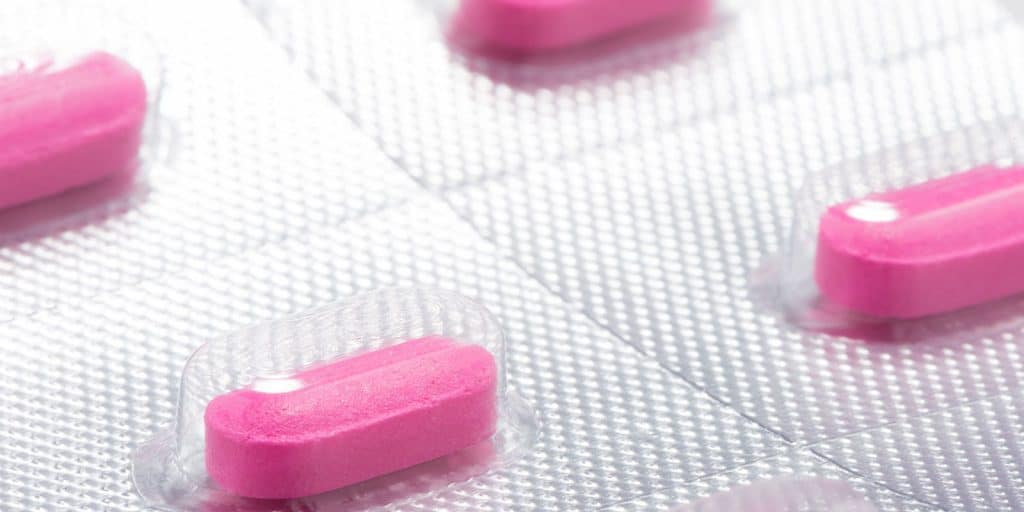TL;DR – Benadryl, complete elimination, takes about 13.2 to 49 hours. Benadryl can be detected in drug tests up to 2 days after ingestion.
Discomfort from itching and allergy can be excruciating, but luckily science has discovered Benadryl as it relieves such annoying symptoms. This is the commercial name for Diphenhydramine, sold as an over-the-counter antihistamine and sedative that relieves the annoying symptoms of allergy, from watery eyes to itchy skin.
Yet, people discovered that it could also help them sleep, so they started using it to treat insomnia. So, is it safe? How long does Benadryl stay in your system?
This article will answer all your questions. So, keep reading to learn more about this topic.
Table of Contents
- What is Benadryl?
- How Long Does Benadryl Stay In Your System?
- Factors That Affect the Time Benadryl Will Stay In Your System
- When Should You Use Benadryl?
- What to Look Out for Before Taking Benadryl
- What Are the Side Effects of Benadryl?
- What Is the Overdose of Benadryl?
- How Can I Get Rid of the Side Effects of Benadryl?
- Wrap Up
What is Benadryl?
Benadryl or Diphenhydramine is classified as one of the antihistamines. It’s mainly used to treat itchy and watery eyes, common cold, scratchy throat, sneezing, itchy skin, and other allergy symptoms. Some doctors also prescribe it to relieve the symptoms of nausea, motion sickness, and parkinsonism.

You can take this medication safely as it helps you overcome several annoying symptoms. It counters the action of histamine in the body, which is naturally produced in response to an allergic trigger.
How Long Does Benadryl Stay In Your System?
The time Benadryl stays in your system depends on the half-life of Diphenhydramine. This depends on several factors, but Benadryl can remain in your system between 2.4 and 9.4 hours on average. This means that after this period, your body would have flushed half of Benadryl out of your system.
You might have to spend between 13.2 and 49 hours to eliminate this drug from your body completely. Benadryl can stay in your system and appear in drug tests up to 2 days after taking it.
The highest concentrations of this drug are present in your system two or four hours after taking Benadryl. During this period, you’re more likely to experience annoying side effects. However, their severity differs from one person to another.
| Description | Time Frame |
|---|---|
| Half-life of Diphenhydramine | 2.4 to 9.4 hours |
| Time to flush half of Benadryl | After 2.4 to 9.4 hours |
| Complete elimination from the body | 13.2 to 49 hours |
| Detectability in drug tests | Up to 2 days |
Testing for Drugs
Drug testing is a potent way to detect the misuse or abuse of drugs. This includes using illegal drugs and misusing prescription and over-the-counter drugs.
Benadryl will start wearing off, and you’ll start feeling better, but it will last for three or four days in your blood, appearing in your blood tests. Traces of the drug can still last in your saliva for three or four days after taking the drug for the last time.
Yet, if your hair was tested for drugs, traces of Diphenhydramine can be present in your hair follicles for up to 90 days or three months. So, if you’re planning to get tested for a medical exam, driving license, or any other legal procedure, you should avoid taking Benadryl.
Factors That Affect the Time Benadryl Will Stay In Your System
Several factors can affect the time Benadryl will show in your drug tests.
Age
Age determines how long Benadryl stays in your system, as people older than 65 and kids under the age of 12 metabolize the drug slower, so it stays longer in their systems.

As a result, the doctor will indicate the right dose based on the patient’s age. Taking the dose of a young adult if you’re older than 65 will make you more prone to the side effects of Diphenhydramine.
Dosage
Taking a higher dose means that your body will spend more time getting rid of the drug. This means that you’ll likely experience more side effects and have the drug in your system even after the average half-life has passed.
So, after 49 hours, you’ll still have more of the drug in your system if you have taken 100 mg, compared to 50 mg. In this case, the side effects of taking Diphenhydramine will wear off slower.
Frequency
The usual dosage should be taken every four to six hours. So, if you take the drug more often, you’re more likely to experience side effects which will last longer.
This is why a lot of people will choose to take Diphenhydramine once or twice a day. However, in this case, it might not effectively treat the condition you’re taking it for.
Metabolism
Not drinking enough water and being dehydrated will affect your body’s ability to flush the drug out. Your body needs water to process this drug, so when you don’t drink enough water, your body won’t be able to flush it out of your system.
Moreover, people with liver problems will have Benadryl longer in their bodies because the active ingredient is processed in the liver. Patients with kidney problems will struggle to get rid of the Diphenhydramine as it passes out of the body in urine with other toxins.
Your body’s mass and nature will also play a significant role. Some people will naturally spend more time getting rid of the drug. In general, people with more fat will process the drug slower.
Interactions
Drinking alcohol or taking other medications will affect your body’s ability to get rid of the drug. Alcohol won’t only increase the half-life of Benadryl, but it will also worsen the side effects. This is why it’s extremely dangerous to mix alcohol with this drug.
Alcohol affects your liver, which processes Benadryl, so your body becomes unable to get rid of the drug properly. Moreover, both Benadryl and alcohol affect your central nervous system, so it will make you feel a bit confused and drowsy.
They sedate your central nervous system and make you unable to function physically and mentally properly. So, driving should be avoided, as your ability to control your vehicle will be compromised.
Diphenhydramine in Benadryl interacts with 415 drugs, and 14 of these interactions are major, so they should be avoided entirely. Here are some interactions that should be taken into consideration.
- With other antihistamines like loratadine and hydroxyzine, you might experience more drowsiness, confusion, and sleepiness.
- With anticholinergic drugs, you might experience increased blurry vision, dry mouth, memory problems, and hallucinations.
- With antipsychotic drugs, you might experience increased confusion, agitation, and hallucinations.
- With benzodiazepines like Valium and Xanax, you might experience more lightheadedness, confusion, dizziness, slurred speech, and slower reactions.
- With opioids, you might experience constipation, euphoria, nausea, and slowed breathing.

When Should You Use Benadryl?
You should use Benadryl only when prescribed by a doctor, although you can get it without a prescription. Yet, checking with your doctor before using this powerful drug is always safer.
Benadryl will help you if your body produces histamine in response to an allergic reaction. It has a drying effect by blocking acetylcholine in your body, which causes watery eyes and a runny nose.
Always ask your doctor or pharmacist about the correct dose and take your medication with or without food. Use a special measuring spoon to avoid increasing the dose when taking liquid Benadryl.
If you’re taking the fast-dissolving tablet, allow it to dissolve on your tongue first before swallowing it. You can also take chewable tablets with or without water.
This drug can help you sleep when taken safely. If the doctor advises you to take Benadryl, you should take it 30 minutes before attempting to sleep. You can also take it 30 minutes before moving if you’re taking it for motion sickness.
What to Look Out for Before Taking Benadryl
Although this drug can relieve many annoying symptoms, it might not be right for you. It’s sold without prescription as an over-the-counter drug, but this doesn’t mean it’s safe for everyone.
For maximum safety, you should ask your doctor or pharmacist before taking Benadryl, especially if you suffer from one of the following conditions.
- If you’re pregnant or breastfeeding. Studies show that Benadryl is safe during pregnancy, but you should still consult your doctor to ensure that it doesn’t contradict any other medications you’re taking.
- You suffer from renal failure, bladder obstruction, or other problems with your urinary tract.
- You have a digestive tract blockage in the stomach or intestines.
- You have asthma or any other chronic breathing disorder.
- You suffer from chronic bronchitis or cough caused by smoking.
- You went through an ileostomy or colostomy.
- You have heart, liver, or kidney disease.
- You suffer from glaucoma or thyroid disorder.
- You take potassium to treat another health issue.

What Are the Side Effects of Benadryl?
The safe dose of Benadryl is between 12.5 and 50 mg, taken every four to six hours. However, some people can experience overdose symptoms when they take more than 25 mg. Here are the side effects of taking Benadryl.
- Drowsiness
- Sleepiness.
- Lack of coordination.
- Dizziness.
- Jitteriness and restlessness.
- Dry mouth or nose.
- Loss of appetite.
- Upset stomach.
- Nausea.
- Headaches.
- Constipation.
People can start experiencing these side effects two hours after taking the drug. If you experience any of these side effects, you shouldn’t take another dose of Benadryl, or you’ll feel worse.
What Is the Overdose of Benadryl?
People can experience overdose symptoms when they take an overdose of Benadryl by mistake. Yet, some people also take this drug on purpose to sleep better or faster.
Overdose symptoms can be caused by taking another antihistamine that adds to the effects of Benadryl. Benzodiazepines like Xanax and Valium can also increase the side effects of Benadryl.
You should also not mix this drug with sedatives, sleep-enhancing medications, tranquilizers, and opioids that affect the central nervous system.
Doctors always advise not to mix this drug with alcohol because the side effects can get worse, and you can experience overdose symptoms.

Experiencing an overdose usually happens after taking a dose higher than 500 mg of Benadryl, but some people can experience these symptoms with a lower dose after mixing it with other drugs. Here are some symptoms you might experience if you overdose on Benadryl.
- Dry eyes.
- Dilated eye pupils.
- Blurry vision.
- Confusion.
- Tinnitus or ringing in the ear.
- Fast heart rate or breathing.
- Low blood pressure.
- Restlessness.
- Mood swings.
- Seizures.
- Drowsiness and falling asleep.
- Loss of balance or inability to stand.
- Nervousness.
- Paranoia.
- Red skin.
- Inability to urinate.
- Hallucinations.
- Memory loss.
- Changes in blood cell levels.
Side Effects in Children
Children under the age of 12 years old shouldn’t take Benadryl except when a doctor prescribes it. Kids under the age of 6 years usually experience a lot of side effects when they take this drug, including the following symptoms.
- Hyperactivity.
- Hallucinations.
- Seizures.
- Irregular heartbeats.
How Can I Get Rid of the Side Effects of Benadryl?
Most side effects of overdosing on Benadryl are temporary, but some are long-term. These include memory blackouts, dementia, depression, anxiety, psychosis, and other withdrawal symptoms.
Older people usually experience more severe side effects when they take Benadryl, so they can experience overdose symptoms even if they haven’t increased the dose. Side effects like drowsiness and lack of coordination can lead to falling, which can be extremely dangerous in the case of seniors.
So, you can avoid serious side effects by following these tips.
- Always stick to the recommended dosage. Taking the drug too frequently or increasing the dosage will do more harm than good.
- Consult with your doctor or pharmacist before taking this drug to ensure it doesn’t interact with any other drug you’re taking.
- Avoid daytime drowsiness by taking Benadryl before you go to sleep. It can actually help you sleep better.
- Eat light food and avoid too much fat that can extend Diphenhydramine’s effects in your body.
- Drink plenty of fluids to help your body flush out the toxins from your system.
- If you aren’t highly drowsy, you can exercise lightly to help your body process the drug.
- Get some sleep and rest until the side effects wear off.

Wrap Up
Benadryl can help with allergy and cold symptoms, but misusing the drug can lead to severe consequences. This drug can stay in your system for up to two days, but it can be detected in hair follicles for up to 90 days.
Some people will experience harsher side effects that might last longer, so you should never exceed the dosage or take Benadryl too frequently. Mixing the drug with alcohol and other drugs can also extend the duration of the side effects.

